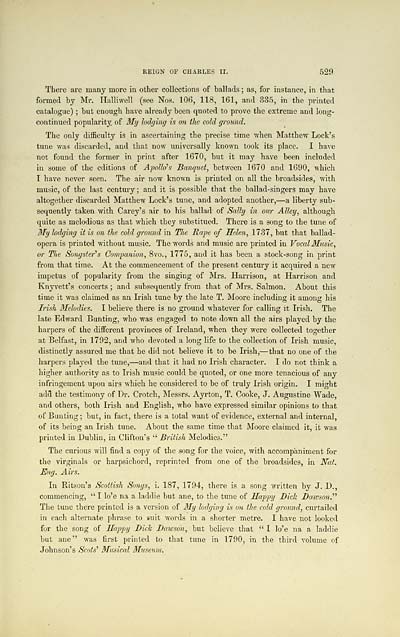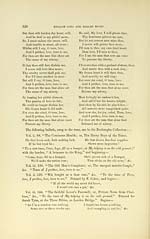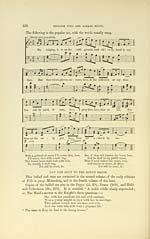Glen Collection of printed music > Printed text > Popular music of the olden time > Volume 2
(153) Page 529
Download files
Complete book:
Individual page:
Thumbnail gallery: Grid view | List view

REIGN OF CHARLES II. 529
There arc many more in other collections of ballads ; as, for instance, in that
formed by Mr. Halliwell (see Nos. 106, 118, 161, and 335, in the printed
catalogue) ; but enough have already been quoted to prove the extreme and long-
continued popularity, of My lodging is on the cold ground.
The only difficulty is in ascertaining the precise time when Matthew Lock's
tune was discarded, and that now universally known took its place. I have
not found the former in print after 1670, but it may have been included
in some of the editions of Apollo' 's Banquet, between 1670 and 1690, which
I have never seen. The air now known is printed on all the broadsides, with
music, of the last century ; and it is possible that the ballad-singers may have
altogether discarded Matthew Lock's tune, and adopted another, — a liberty sub-
sequently taken with Carey's air to his ballad of Sally in our Alley, although
quite as melodious as that which they substitued. There is a song to the tune of
My lodging it is on the cold ground in The Rape of Helen, 1737, but that ballad-
opera is printed without music. The words and music are printed in Vocal Music,
or The Songster's Companion, 8vo., 1775, and it has been a stock-song in print
from that time. At the commencement of the present century it acquired a new
impetus of popularity from the singing of Mrs. Harrison, at Harrison and
Knyvett's concerts ; and subsequently from that of Mrs. Salmon. About this
time it was claimed as an Lish tune by the late T. Moore including it among his
Irish Melodies. I believe there is no ground whatever for calling it Irish. The
late Edward Bunting, who was engaged to note down all the airs played by the
harpers of the different provinces of Ireland, when they were collected together
at Belfast, in 1792, and who devoted a long life to the collection of Lish music,
distinctly assured me that he did not believe it to be Irish, — that no one of the
harpers played the tune, — and that it had no Irish character. I do not think a
higher authority as to Irish music could be quoted, or one more tenacious of any
infringement upon airs which he considered to be of truly Irish origin. I might
add the testimony of Dr. Crotch, Messrs. Ayrton, T. Cooke, J. Augustine Wade,
and others, both Irish and English, who have expressed similar opinions to that
of Bunting ; but, in fact, there is a total want of evidence, external and internal,
of its being an Irish tune. About the same time that Moore claimed it, it was
printed in Dublin, in Clifton's " British Melodies."
The curious will find a copy of the song for the voice, with accompaniment for
the virginals or harpsichord, reprinted from one of the broadsides, in Nat.
Eng. Airs.
In Ritson's Scottish Songs, i. 187, 1794, there is a song written by J. D.,
commencing, " I lo'e na a laddie but ane, to the tune of Sappy Dick Dawson"
The tune there printed is a version of My lodging is on the cold ground, curtailed
in each alternate phrase to suit words in a shorter metre. I have not looked
for the song of Happy Dick Daivson, but believe that " I lo'e na a laddie
but ane" was first printed to that tune in 1790, in the third volume of
Johnson's Scots' Musical Museum.
There arc many more in other collections of ballads ; as, for instance, in that
formed by Mr. Halliwell (see Nos. 106, 118, 161, and 335, in the printed
catalogue) ; but enough have already been quoted to prove the extreme and long-
continued popularity, of My lodging is on the cold ground.
The only difficulty is in ascertaining the precise time when Matthew Lock's
tune was discarded, and that now universally known took its place. I have
not found the former in print after 1670, but it may have been included
in some of the editions of Apollo' 's Banquet, between 1670 and 1690, which
I have never seen. The air now known is printed on all the broadsides, with
music, of the last century ; and it is possible that the ballad-singers may have
altogether discarded Matthew Lock's tune, and adopted another, — a liberty sub-
sequently taken with Carey's air to his ballad of Sally in our Alley, although
quite as melodious as that which they substitued. There is a song to the tune of
My lodging it is on the cold ground in The Rape of Helen, 1737, but that ballad-
opera is printed without music. The words and music are printed in Vocal Music,
or The Songster's Companion, 8vo., 1775, and it has been a stock-song in print
from that time. At the commencement of the present century it acquired a new
impetus of popularity from the singing of Mrs. Harrison, at Harrison and
Knyvett's concerts ; and subsequently from that of Mrs. Salmon. About this
time it was claimed as an Lish tune by the late T. Moore including it among his
Irish Melodies. I believe there is no ground whatever for calling it Irish. The
late Edward Bunting, who was engaged to note down all the airs played by the
harpers of the different provinces of Ireland, when they were collected together
at Belfast, in 1792, and who devoted a long life to the collection of Lish music,
distinctly assured me that he did not believe it to be Irish, — that no one of the
harpers played the tune, — and that it had no Irish character. I do not think a
higher authority as to Irish music could be quoted, or one more tenacious of any
infringement upon airs which he considered to be of truly Irish origin. I might
add the testimony of Dr. Crotch, Messrs. Ayrton, T. Cooke, J. Augustine Wade,
and others, both Irish and English, who have expressed similar opinions to that
of Bunting ; but, in fact, there is a total want of evidence, external and internal,
of its being an Irish tune. About the same time that Moore claimed it, it was
printed in Dublin, in Clifton's " British Melodies."
The curious will find a copy of the song for the voice, with accompaniment for
the virginals or harpsichord, reprinted from one of the broadsides, in Nat.
Eng. Airs.
In Ritson's Scottish Songs, i. 187, 1794, there is a song written by J. D.,
commencing, " I lo'e na a laddie but ane, to the tune of Sappy Dick Dawson"
The tune there printed is a version of My lodging is on the cold ground, curtailed
in each alternate phrase to suit words in a shorter metre. I have not looked
for the song of Happy Dick Daivson, but believe that " I lo'e na a laddie
but ane" was first printed to that tune in 1790, in the third volume of
Johnson's Scots' Musical Museum.
Set display mode to: Large image | Transcription
Images and transcriptions on this page, including medium image downloads, may be used under the Creative Commons Attribution 4.0 International Licence unless otherwise stated. ![]()
| Special collections of printed music > Glen Collection of printed music > Printed text > Popular music of the olden time > Volume 2 > (153) Page 529 |
|---|
| Permanent URL | https://digital.nls.uk/91363830 |
|---|
| Shelfmark | Glen.254a |
|---|---|
| Additional NLS resources: | |
| Attribution and copyright: |
|
| Description | Scottish songs and music of the 18th and early 19th centuries, including music for the Highland bagpipe. These are selected items from the collection of John Glen (1833 to 1904). Also includes a few manuscripts, some treatises, and other books on the subject. |
|---|
| Description | The Glen Collection and the Inglis Collection represent mainly 18th and 19th century Scottish music, including Scottish songs. The collections of Berlioz and Verdi collected by bibliographer Cecil Hopkinson contain contemporary and later editions of the works of the two composers Berlioz and Verdi. |
|---|

